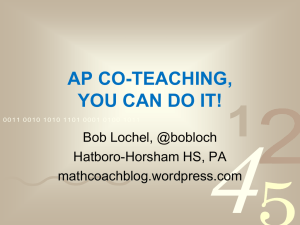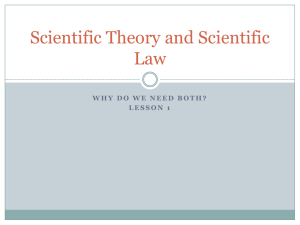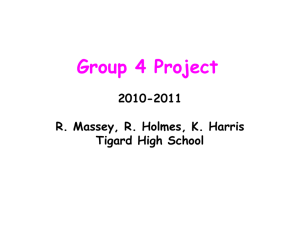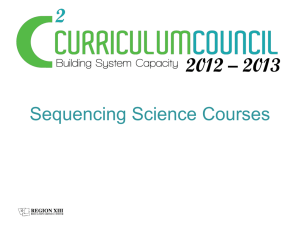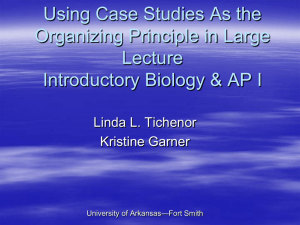Selecting Science Courses
advertisement
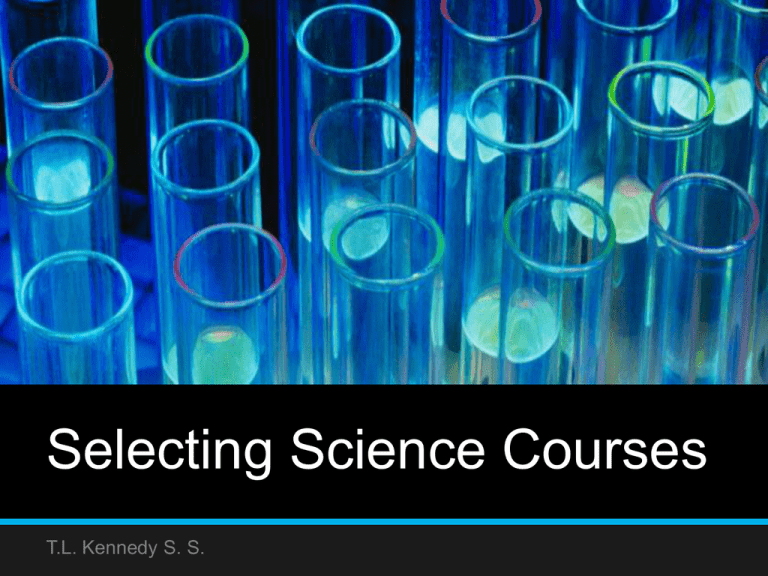
Selecting Science Courses T.L. Kennedy S. S. Click on a box to take you to a course description Grade 11 University Biology (SBI3U0) Grade 12 University Biology (SBI4U0) Grade 9 Academic Science (SNC1D0) Grade 10 Academic Science (SNC2D0) Grade 11 University Chemistry (SCH3U0) Grade 12 University Chemistry (SCH4U0) Grade 9 Applied Science (SNC1P0) Grade 10 Applied Science (SNC2P0) Grade 11 University Physics (SPH3U0) Grade 12 College Chemistry (SCH4C0) Grade 11 College Biology (SBI3C0) Grade 12 University Physics (SPH4U0) Grade 11 Environmental Science for Workplace (SVN3E0) Grade 12 College Physics (SPH4C0) Grade 9 English Language Learner Science (SNC1PL) Grade 9 Academic Science (SNC1D0) • In this course, you learn about Ecology, Chemistry, Electricity and Astronomy. • We go on field trips, you learn about the periodic table and do experiments with chemicals, you will build electric circuits and you will learn about our solar system and stars. • With this course, you can go onto grade 10 academic science or grade 10 applied science • Academic courses have more emphasis on theory and learning details and facts but still include hands on activities. Academic courses are required for University courses in grade 11. Go back to course description page Grade 9 Applied Science (SNC1P0) • In this course, you learn about Ecology, Chemistry, Electricity and Astronomy. • We go on field trips, you learn about the periodic table and do experiments with chemicals, you will build electric circuits and you will learn about our solar system and stars. • With this course, you can go onto grade 10 academic science or grade 10 applied science. If switching to academic, a 70% average is recommended. • Applied courses have more emphasis on practical activities with less emphasis on theory. With applied courses, you typically take college level courses in grade 11. Go back to course description page Grade 9 Applied Science for English Language Learners. (SNC1PL) • In this course, you learn about Ecology, Chemistry, Electricity and Astronomy with an emphasis on literacy skills. • We go on field trips, you learn about the periodic table and do experiments with chemicals, you will build electric circuits and you will learn about our solar system and stars. • With this course, you can go onto grade 10 academic science or grade 10 applied science. If switching to academic, an 80% average is recommended. • Applied courses have more emphasis on practical activities with less emphasis on theory. With applied courses, you typically take college level courses in grade 11. Go back to course description page Grade 10 Academic Science (SNC2D0) • In this course, you learn about Tissues, Chemistry, Optics and Climate Change. • We do dissections, you learn about the chemical reactions and do experiments with acids and bases, you will do experiments with light, lenses and mirrors and you will learn about our impact on the environment • With this course, you can go onto grade 11 University Biology, Chemistry and Physics. It is recommended that you have an average of 60% to continue in the sciences. • Grade 9 and 10 gave you a taste of all the sciences. In grade 11 the courses become specialized. Taking all three in grade 11 gives you more choice in grade 12. Go back to course description page Grade 10 Applied Science (SNC2P0) • In this course, you learn about Tissues, Chemistry, Optics and Climate Change. • We do dissections, you learn about the chemical reactions and do experiments with acids and bases, you will do experiments with light, lenses and mirrors and you will learn about our impact on the environment • With this course, you can go onto grade 11 College Biology, grade 12 College Chemistry, grade 12 College Physics or grade 11 Environmental Science for Workplace. • Grade 9 and 10 gave you a taste of all the sciences. In grade 11 the courses become specialized. Go back to course description page Grade 11 University Biology (SBI3U0) • In this course, you learn aboutbiodiversity, genetic processes, evolution, the structure and function of animals, and the anatomy, growth, and function of plants. • We do dissections, microscope labs, computer simulations, and investigate current issues in biology. • With this course, you can go onto grade 12 University Biology. It is recommended that you have an average of 60% to continue in grade 12 University Biology. • University Programs that typically require University Biology are: Forensics, Biotechnology, Nursing, Genetics, Kinesiology. Go back to course description page Grade 11 University Chemistry (SCH3U0) • In this course, you learn about chemical nomenclature, chemical reactions, calculations in chemical reactions, solutions, and gases. You will also learn about common lab equipment and how to use it. • We do a variety of hands on labs, simulations and other activities and assignments to help you understand the core concepts covered in the curriculum. • With this course, you can go onto grade 12 University Chemistry. It is recommended that you have an average of 60% to continue in grade 12 University Chemistry. • University Programs that typically require University Chemistry are: • Biochemistry • Chemical Engineer • Toxicology • Biology (recommended) Go back to course description page Grade 11 University Physics (SPH3U0) • In this course, you learn about Kinematics, Forces, Energy and Society, Waves and Sound and Electricity and Magnetism • We do many hands on experiments, do debates, build models, do presentations and learn problem solving skills. • With this course, you can go onto grade 12 University Physics. It is recommended that you have an average of 60% to continue in grade 12 University Physics. • University Programs that typically require University Physics are: Engineering, Kinesiology, Computer Science, Architecture, Medical Sciences and Science. Go back to course description page Grade 11 College Biology (SBI3C0) • In this course, you learn aboutcellular biology, microbiology, genetics, the anatomy of mammals, and the structure and role of plants in the natural environment. • We do dissections, microscope labs, labs, simulations, and investigate current issues in biology. • If you did not take grade 10 academic science, this is the last biology course you can take. If you still want to try science courses, you can continue in grade 12 College Chemistry and Physics. • College Programs that typically require College Biology are: Microbiology , Environmental Technology, Medical Laboratory Technology, Pharmaceutical and Food Science Technology, Nursing. Go back to course description page Grade 11 Environmental Science Workplace (SVN3E0) • In this course, you learn about: Our impact on the environment, human health, energy conservation, natural resource management and safety in the workplace • We do hands on activities, computer simulations and research activities. • At the end of this course, you are prepared to work in science related jobs. If you still want to take science courses, you can consider taking the College level courses in grades 11 and 12. • Workplace examples include: warehouse employee, food industry, manufacturing industry and personal care industry Go back to course description page Grade 12 University Biology (SBI4U0) • In this course, you learn about biochemistry, metabolic processes, molecular genetics, homeostasis, and population dynamics • We do field trips, labs, host guest speakers and investigate current issues in biology. • Career possibilities include: Microbiologist, Environmental Engineering, Geneticist, Occupational Therapist, Nurse. Go back to course description page Grade 12 University Chemistry (SCH4U0) • In this course, you learn about organic molecules and how they behave, the structure and properties of matter, Energy changes and Rates of Reactionsin chemical systems , Equilibrium, as well as Electrochemistry. • We doa variety of hands on labs and activities using both traditional equipment and probeware technology to collect and analyze data; a variety of assignments that foster your learning both independently and collaboratively. • Career possibilities include: • Biochemistry • Chemical Engineer • Toxicology • Biology (recommended) Go back to course description page Grade 12 College Chemistry (SCH4C0) • In this course, you learn about: • matter and how it can be studied, and used to learn about other unknown substances; • organic molecules and their roles in chemistry as well as living things; • electrochemistry and how it is used in every applications like gold plating etc.; • calculations and how they are used in manufacturing chemicals; • how, and what role chemistry plays in the environmentand its sustainability . • We do a variety of labs and simulations that support what we learn in class. • If you did not take grade 10 academic science, this is the last chemistry course you can take. • College Programs that typically require College Chemistry are: • chemical lab technician • veterinary technician • pharmacy technician Go back to course description page Grade 12 University Physics (SPH4U0) • In this course, you learn about Dynamics, Energy and Momentum, Fields, Wave Nature of Light and Revolutions in Modern Physics. • We: do extensive problem solving, build models, do lab activities in real and simulated environments, analyze roller coasters and learn about the physical world in interest capturing detail. • Career possibilities include: Professor, Engineer, Architect, Sports Medicine, Aircraft Design, Pilot, Car Design, Urban Planning, Medical Technologist and Astrophysicist Go back to course description page Grade 12 College Physics (SPH4C0) • In this course, you learn about: motion, mechanical systems, electricity and magnetism, energy transformations and hydraulic and pneumatic systems • We do many hands on experiments, build models, do presentations, use computer simulations and learn problem solving skills. • If you did not take grade 10 academic science, this is the last physics course you can take. • College Programs that typically require College Physics are: Electrician, Computer Technologist, Electronics Repair and Car Mechanic Go back to course description page
